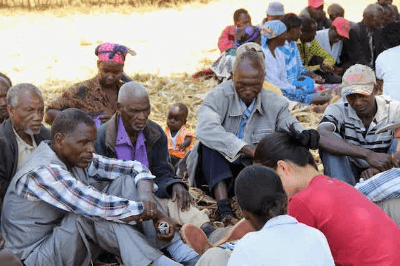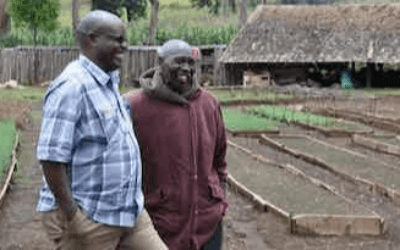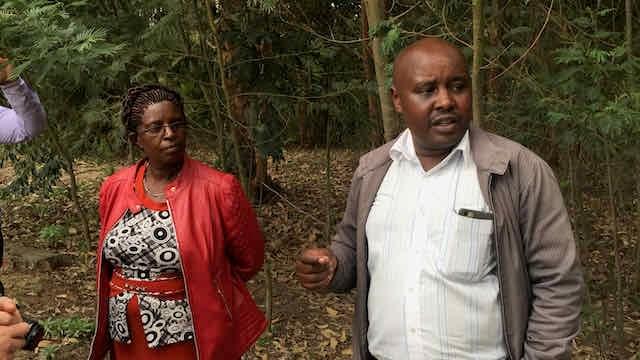


2. Small Groups are the Foundation of TIST
When you form your Small Group, you will be working together for at least 60 years (the length of the GHG contract)! TIST Small Groups are where TIST members come together to share information, learn from each other, and build each other up. If you are taking this training as a small group, take time to identify your group leader for this week, and then decide who will be group leader the next time you meet. By doing this you will start practicing the TIST Small Group best practices immediately!
What is a TIST Small Group?
TIST Small Groups are made of 6-12 members who come from at least 3 different families who all live near each other. Good TIST Small Groups are made up of people who are embodying the TIST values. Men and women in the same small group often accomplish the most. In order to join TIST, you must belong to a Small Group.
By starting or joining a TIST Small Group, you are agreeing to certain responsibilities to both TIST and your Small Group. These responsibilities are:
Planting Trees
Each Small Group will plant at least 1,000 trees, or more, depending on the size of the Small Group and their available land.
Meet Regularly
Small Groups should meet once per week.
Embodying the TIST Values
Each Small Group member commits to upholding and practicing the TIST Values.
Use Small Group Best Practices
These Best Practices include rotational leadership and Kujengana.
The Benefits of TIST Small Groups
TIST has operated using Small Groups from the beginning, and TIST members have found Small Groups to be the best way for sharing information and building relationships. After over 20 years of working in farmer-led Small Groups, TIST has discovered valuable benefits to Small Groups. These benefits are:
Getting Work Done
TIST participants get much more work done in Small Groups.
Accountability
Small Groups help TIST members be accountable to each other. When one person is successful, the whole group is successful.
Encouragement
TIST Small Groups allow members to share encouragement and experience.
Learn from Peers
TIST Small Groups are made of people from at least three different families so that different people will have the opportunity to lead and meet new people.
Big Results with a Low Budget
By working together, small groups will achieve BIG results.
Growing Leaders
TIST Small Groups are nurseries for leadership development, and many small group members go on to serve with TIST.
Rotating Leadership
Rotational Leadership is a core part of the TIST Small Group. TIST Small Groups will work together for over thirty years, and each person in the group will have the opportunity to act as the group leader. This ensures that every person in the group has the opportunity to participate as both a group member and a leader.
In a TIST Small Group, there are three leadership roles:

Leader
The Leader is a servant to the group, and facilitates the meetings and makes sure each person in the group is able to participate. The leader exemplifies the TIST values and encourages group members.

Co-Leader
The Co-Leader helps the Leader facilitate the group and serves as the group time-keeper. The Co-Leader becomes the Leader at the next meeting, reads the meeting notes, and helps to train the Accountability Person.

Accountability Person
The Accountability Person reminds the group of their responsibilities and previous and current commitments. They take the meeting notes and help support the Leader and Co-Leader. The Accountability Person becomes the Co-Leader at the next meeting.
Rotating Leadership is practiced at every level of TIST, including both Small Groups and Clusters. Leadership is rotated at every meeting (weekly), with the Co-Leader becoming the Leader, the Accountability Person becoming the Co-Leader, and a new Accountability Person being elected.
Elections are done democratically and each person in the TIST Small Group has an equal vote.
Leadership alternates between men and women at each level of TIST. This means that if the current Accountability Person is a man, the next one should be a woman. Thus the leadership always alternates between men and women.
The Benefits of Rotating Leadership
There are many benefits to rotating leadership!
All Serve
Every person has the opportunity to serve as a leader.
Using Gifts
Every person has different and unique gifts to offer.
Equal Opportunity
There are equal opportunities for both men and women.
Encouragement
Rotating leadership encourages everyone to lead.
Learn from Each Other
We get to learn from each other about what makes a good leader.
New Ideas
Rotating leadership makes sure there are new ideas and different types of leadership in each group.
What is Kujengana?
Kujengana is the Swahili word that means "to build up," and it is something that is done at the end of every TIST meeting. Kujengana is a very important part of each weekly Small Group meeting. It is at the very foundation of the TIST Values. Each person in TIST has their own special talents and gifts that they bring to TIST. Every person is a leader, and every person has something valuable to contribute. Kujengana is the practice of saying this value out loud.
Kujengana is practiced at the conclusion of every Small Group meeting. Each person in the group takes a turn telling the leader one positive thing that the leader did during the meeting. Think of it as something a "fly on the wall" would see and hear. These are specific statements, and each member of the group says something different. Some groups even do Kujengana for the co-leader.
In response to Kujengana, the leader simply says "thank you." There is no discussion of how things could have been done differently or better. By practicing rotating leadership, everyone gets to experience Kujengana.
The Benefits of Kujengana
Why do we practice Kujengana? Because it has many wonderful benefits to everyone in TIST. Here are some of the benefits that TIST members have reported from Kujengana:
Confidence
This practice brings confidence to leaders who have done something good.
Learn from Each Other
Kujengana helps future leaders learn from the good ideas of current leaders.
Contribution
Every person contributes to every meeting with Kujengana.
Growing Leaders
Kujengana and rotating leadership are important for growing leaders in TIST.
A TIST Farmer Explains the Small Groups
Hear directly from a TIST farmer on TIST Small Groups.
Ready to start a Small Group?
Congratulations! Now that you have learned about TIST Small Groups, you are ready to start your own group. Think about who you would like to join and invite them to complete these trainings. Ready to learn about the TIST Values? Click on the button below.
Side-Loading?
Do you need to take this training offline? Click on the button to the right to download this training content for side loading.
Have a question or comment? Click here to let us know.
Copyright © loading...




